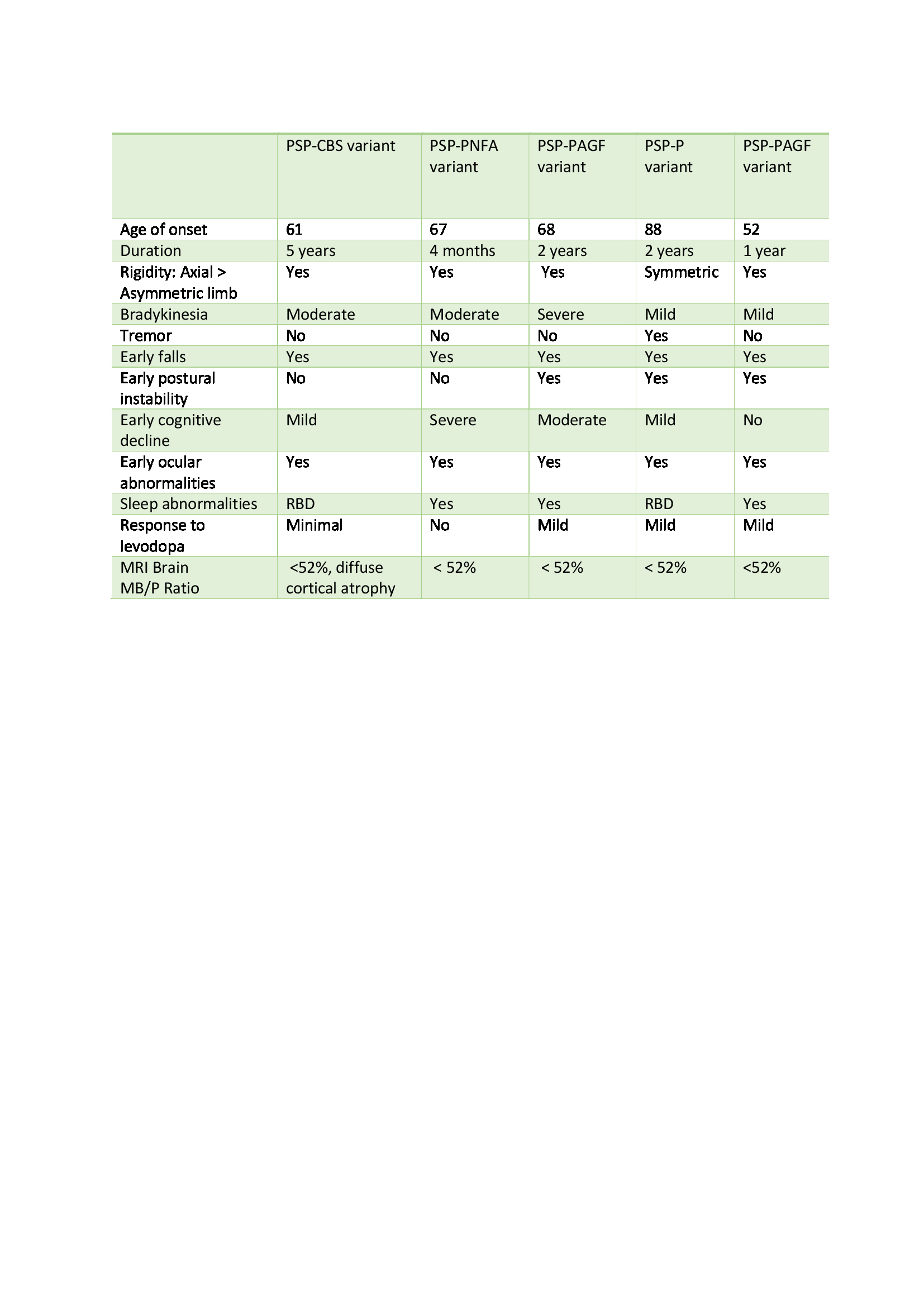Session Information
Date: Monday, June 5, 2017
Session Title: Parkinsonism, MSA, PSP (Secondary and Parkinsonism-Plus)
Session Time: 1:45pm-3:15pm
Location: Exhibit Hall C
Objective: To present the phenotypic heterogeneity we observed in 5 PSP variants.
Background: Progressive supranuclear palsy (PSP) is a primary tauopathy characterised by progressive gait disturbances, postural instability, supranuclear gaze palsy and fronto-limbic cognitive deficits, classical Richardson’s Syndrome. This is the commonest Parkinson plus syndrome constituting 5-6%.1There is considerable phenotypic heterogeneity in the presentation of PSP. Until date 5 variants are well described and newer variants are still evolving. We are presenting our experience of 5 patients with PSP variants.
Methods: Between 2015 and 2016, we encountered 5 patients with PSP, all of which were atypical. All of them met the probable PSP criteria of NINDS-PSPS. However, they varied in their clinical manifestations and had discernible features differing from classic RS-PSP. The clinical characteristics are summarized in table 1.
Results: The PSP-CBS and PSP-P variants we encountered had polysomnographic proven evidence of RBD. This finding is less prevalent in PSP. This would probably be explained from the degeneration of PPTg nuclei in the brain stem, which appears to be vital for the generation of REM sleep.2The median interval between onset and diagnosis is 3 years (range, 0.5-9years). The PSP-PNFA variant presented as early as 4 months. Another peculiarities observed in this patient were rapidly progressing dementia, vertical gaze palsy at symptom onset and substantial reduction in spontaneous speech. The PSP-P variant seems to be the oldest case of PSP reported hitherto, came to the medical limelight when he developed aspiration pneumonia.
Conclusions: The recognition of PSP variants suggests that other than classic Richardson’s syndrome there are other related, but distinct clinical syndromes, which could be easily misdiagnosed in the early stages. A proper understanding of the variants is crucial in the management considering the rapid progression of this disorder and refractoriness to levodopa therapy.
References:
- David R Williams, Andrew J Lees. Progressive supranuclear palsy: clinicopathological concepts and diagnostic challenges. Lancet Neurology 2009; 8: 270-79
- Sabra M. Abbott, Aleksander Videnovic. Sleep Disorders in Atypical Parkinsonism. Movement Disorders Clinical practice.
To cite this abstract in AMA style:
S. BHADRAN, S. ABRAHAM, B. NATARAJAN, A. MEKKATTUKUNNEL, J. KRISHNAN, R. ISAAC, P.K. PAL. Phenotypic Heterogeneity in PSP Variants – A Case Series [abstract]. Mov Disord. 2017; 32 (suppl 2). https://www.mdsabstracts.org/abstract/phenotypic-heterogeneity-in-psp-variants-a-case-series/. Accessed February 27, 2026.« Back to 2017 International Congress
MDS Abstracts - https://www.mdsabstracts.org/abstract/phenotypic-heterogeneity-in-psp-variants-a-case-series/

